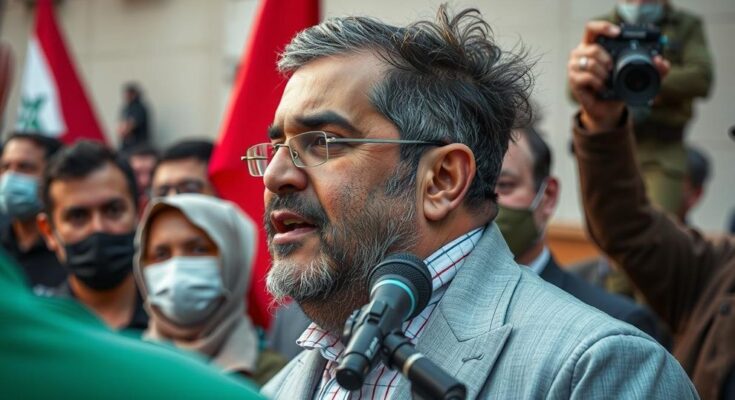Said Ait Mahdi, a Moroccan activist, has been sentenced to three months in prison for leading protests concerning the government’s inadequate response to a devastating earthquake. The case has drawn criticism from human rights groups, who view the ruling as politically motivated and arbitrary. Amid public outcry for better recovery efforts, Mahdi remains a pivotal figure advocating for affected communities in Morocco.
A prominent Moroccan activist, Said Ait Mahdi, who recently led protests criticizing the government’s response to a devastating earthquake, has been sentenced to three months in prison. The ruling has drawn sharp condemnation from human rights advocates who view it as a politically motivated action targeting dissent. Ait Mahdi’s sentence also includes a fine of over $1,000, decided against a backdrop of significant public outcry in the earthquake-stricken area.
The earthquake, which struck in September 2023 with a magnitude of 6.8, caused catastrophic damage in the Al Haouz region, resulting in the loss of nearly 3,000 lives and the destruction of numerous structures, including homes and healthcare facilities. Despite the damage inflicted, many residents continue to reside in tents or temporary accommodations while officials grapple with recovery efforts.
Ait Mahdi is notably the first activist to receive such a sentence in relation to the protests stemming from the earthquake aftermath. Attending demonstrations, the civil society group has accused local authorities of severe mismanagement in repairing the damage left in the earthquake’s wake. Legal representatives indicated that while the typical punishment for similar charges tends to average around one year, Ait Mahdi’s sentence could have been more severe.
Notably, three activists facing comparable charges to Ait Mahdi were acquitted earlier this week, highlighting the contentious nature of the legal proceedings surrounding the protests. Civil liberties organizations have vocally criticized the arrest, deeming it a blatant attempt to stifle dissent. The Moroccan Association for Human Rights denounced the sentence as an arbitrary act of retribution for Ait Mahdi’s vocal advocacy for those affected by the natural disaster.
Furthermore, a coalition of NGOs labeled the charges against Ait Mahdi as an effort by the government to divert attention from acknowledged failings in disaster response initiatives. These flaws have notably exacerbated existing inequalities, particularly affecting indigenous communities in Morocco. In response, the Moroccan government has committed over $11.5 billion to support recovery initiatives over the upcoming five years, signifying acknowledgment of the pressing need for remedial action.
Simultaneously, demonstrators have persisted in bringing attention to the slow pace of reconstruction efforts, stressing the need for immediate and effective action to help those affected. Public support for Ait Mahdi remains evident, as significant rallies took place in front of the courthouse where he was tried, advocating for his release and acknowledging his role as a prominent voice for marginalized communities affected by the earthquake.
The recent sentencing of activist Said Ait Mahdi has ignited discussions about governmental accountability in Morocco, particularly in relation to disaster recovery efforts. Following the September 2023 earthquake that devastated the Al Haouz region, protests erupted, revealing widespread frustrations regarding governmental responsiveness. This situation underscores a growing concern over civil liberties and the state’s treatment of dissenting voices, especially those advocating for marginalized populations affected by regional inequities. The arrest and sentencing of Ait Mahdi reflect larger socio-political tensions as Moroccans seek government engagement and transparency in recovery initiatives.
In summary, the sentencing of Said Ait Mahdi represents a critical juncture in the ongoing struggle for civil liberties in Morocco, particularly surrounding the response to the catastrophic earthquake in September 2023. The human rights implications of this case are profound, drawing attention to the plight of marginalized communities and the government’s commitment to effective recovery. As public support for Ait Mahdi continues to grow, it remains essential to scrutinize the balance between activism and state authority in Morocco, especially as citizens advocate for justice and accountability following the disaster.
Original Source: www.independent.co.uk




